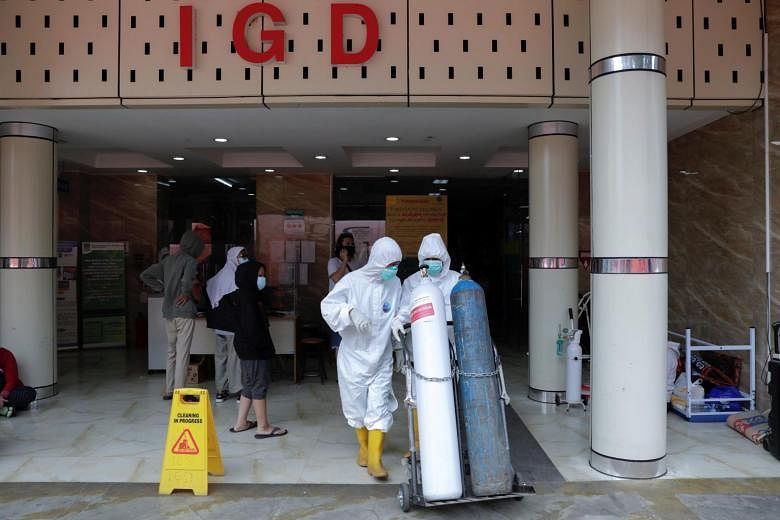JAKARTA - The number of fully vaccinated medical workers in Jakarta who came down with Covid-19 increased five times in just three months this year, most of them infected with the Delta variant, a study by Indonesia's health ministry has found.
The study found that 5.03 per cent of the medical workers fully vaccinated with Sinovac's CoronaVac vaccine contracted the virus between April and June, compared with 0.98 per cent of such workers from January to March.
Of those fully vaccinated and then infected, 0.01 per cent died in the April to June period, compared with 0.001 per cent in the previous three months.
The Delta variant, first detected in India, arrived in Indonesia around March. It has dominated more than 90 per cent of the total Covid-19 cases found since June, according to the whole genome sequencing surveillance by the government.
The study involved 71,455 nurses, midwives, doctors, hospital technicians and other support staff in Jakarta hospitals.
Indonesia mainly relies on CoronaVac for its national inoculation programme that started in mid-January.
Dr Adi Sasongko, who teaches public health at the University of Indonesia, told The Straits Times that several factors contributed to the spike in vaccinated medical workers contracting the virus.
These include exhaustion as overworked medical staff are being overwhelmed by Covid-19 patients; substandard protective health gear; procedures and protocols in wearing hazmat suits that were not properly followed; a lack of contact tracing; and low vaccination coverage.
The study said: "Medical workers are a high-risk group who could get exposed to Covid-19 through interactions with infected patients, as well as through the society."
The research was conducted during a "dynamic period", when cases surged in February before going on a downward trend until mid-May, and surged again shortly after the Hari Raya Aidilfitri holidays.
An estimated 2.6 million people return to major cities across Indonesia's most-populated island Java, especially Jakarta, during the holidays.
Most of these people circumvented a ban - in effect from May 6 to 17 - on the traditional exodus, better known as mudik, ahead of Aidilfitri.
This then led to an unprecedented surge in Covid-19 cases dominated by the Delta variant, prompting the government to quickly convert more hospital beds to treat such patients.
The country was also struggling with skyrocketing demand for medical oxygen as it battled the pandemic.
Health Minister Budi Gunadi Sadikin swiftly asked local oxygen suppliers to reallocate excess capacity earmarked for industrial purposes for medical use.
West Java province, home to the largest oxygen plant in Indonesia, was mainly relied on to help meet the demand elsewhere in the country, as the authorities helped to deploy trucks to accelerate distribution.
Overworked doctors and nurses also appealed to the government to impose stricter containment measures to curb surges that it did so. The government declared partial lockdowns on many parts of the country starting on July 3 that are still in force today.












